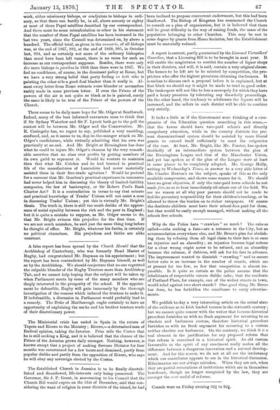There seems to be daily more hope for Mr. Odger
at Southwark. Indeed, many of the best informed canvassers seem to think that if Sir Sydney Waterlow and Sir F. Lycett both go to the poll the -contest will be between Mr. Odger and the Conservative. Mr. R. Coningsby has, we regret to say, published a very rambling, confused, and, as it seems to us, dog-in-the-manger attack on Mr. Odger's candidature, while virtually admitting that his own was practically at an end. And Mr. Bright at Birmingham has done what he could to injure Mr. Odger's chances by the very remark- able assertion that no class ever profits by getting members of its own guild to represent it. Would he venture to maintain then that what Mr. Cobden and he had learned in practical life of the manufactures of Lancashire had never materially assisted them in their free-trade agitation ? Would he pretend for a moment that Mr. Goschen's practical experience in commerce had never helped him in discussing the theory of limited-liability companies, the law of bankruptcy, or Sir Robert Peel's Bank 'Charter Act? It is a contradiction in terms to say that minute and practical knowledge of Trades' Unions will not assist a man in discussing Trades' Unions ; yet this is virtually Mr. Bright's thesis. The truth is, there is still too much dislike of the appear- ance of social equality between the rich and the poor in England ; but it is quite a mistake to suppose, as Mr. Odger seems to do, that Mr. Bright evinces this prejudice for the first time. If we are not much mistaken, he said just the same thing long before he thought of office. Mr. Bright, whatever his faults, is certainly no political chameleon. His prejudices and faiths are alike constant.






























 Previous page
Previous page